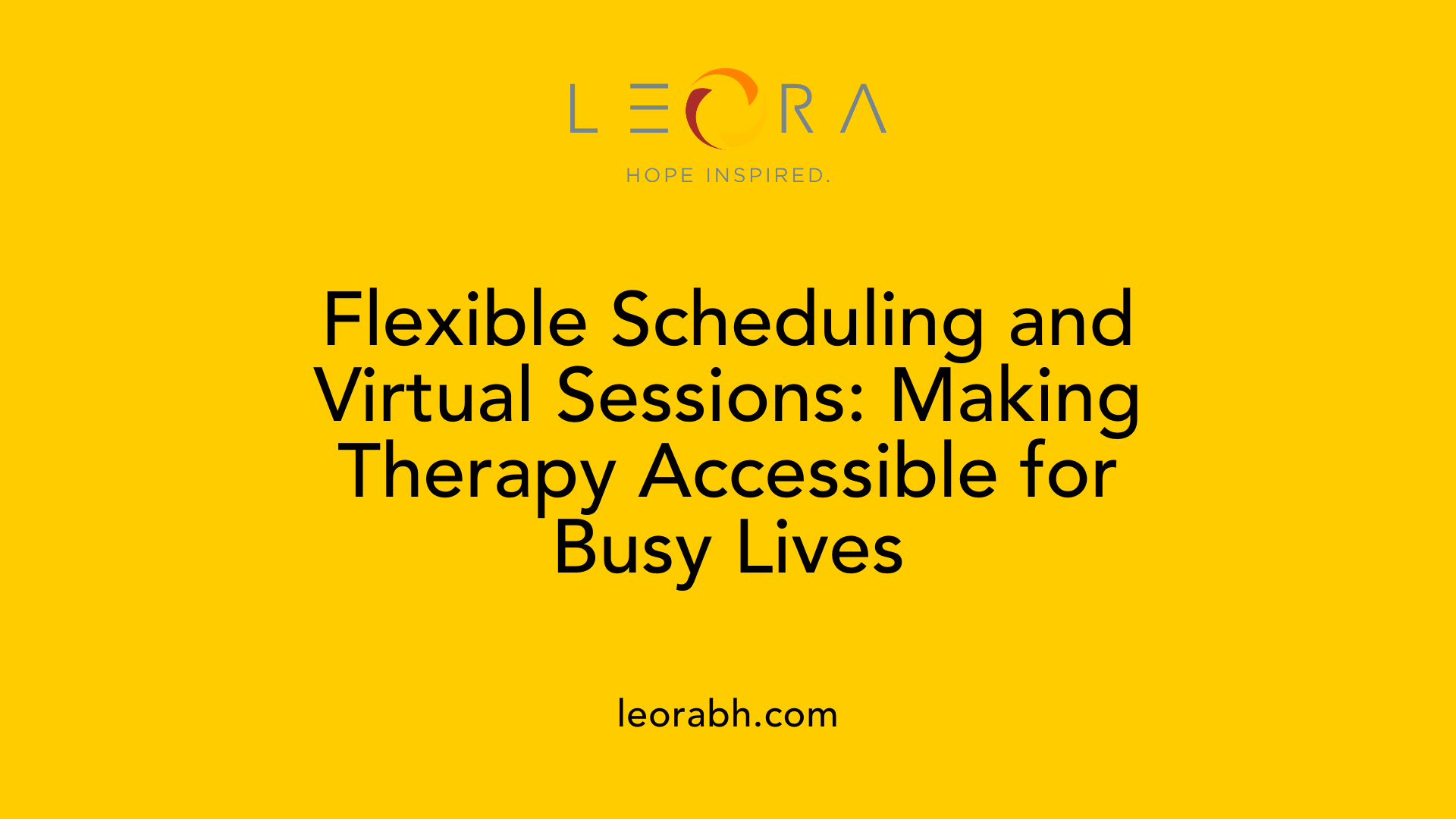What makes IOP a flexible option for busy adults in recovery
Flexible Treatment: Unlocking Recovery for Busy Adults
Adapting Recovery to Modern Lifestyles
In today’s fast-paced world, finding time for comprehensive mental health and addiction treatment can be challenging for busy adults juggling work, family, and personal commitments. Intensive Outpatient Programs (IOPs) have emerged as a highly adaptable solution, offering structured, evidence-based care that seamlessly integrates into daily routines, fostering sustained recovery while respecting individual lifestyles.
Structure and Modalities of IOPs Supporting Busy Lifestyles

What is the structure of IOP and what modalities does it incorporate to support individuals with busy lifestyles?
An Intensive Outpatient Program (IOP) is carefully designed to offer comprehensive mental health and addiction treatment while respecting the busy schedules of participants. The structure typically involves sessions that last from two to four hours each, scheduled three to five times weekly. This arrangement allows individuals to attend therapy sessions without needing to stay overnight at a facility, making it highly adaptable for working professionals, students, and parents.
The therapeutic techniques used within IOPs are diverse and evidence-based, aiming to address a wide range of mental health issues and addiction challenges. Common modalities include group therapy, which fosters peer support and shared learning, and individual counseling tailored to personal needs. Family therapy sessions are often integrated to improve family dynamics and bolster support systems.
In addition to traditional talk therapies like Cognitive Behavioral Therapy (CBT) and Dialectical Behavior Therapy (DBT), IOPs frequently incorporate motivational interviewing to enhance participants' commitment, as well as psychoeducational workshops to increase understanding of their conditions.
Holistic approaches are also popular, including yoga, mindfulness exercises, art therapy, and stress management techniques, promoting physical and emotional well-being. Personalized treatment plans are crafted based on initial assessments and adjusted as therapy progresses, ensuring that each participant’s unique needs are met.
This multifaceted framework allows individuals to maintain their daily responsibilities—such as work, school, and family commitments—while engaging in intensive treatment. By offering flexible scheduling alongside a rich variety of therapeutic modalities, IOPs support sustainable recovery and long-term stability for those with demanding lifestyles.
How IOPs Accommodate a Busy Schedule and Incorporate Into Daily Life

Flexible scheduling options
Intensive Outpatient Programs (IOPs) are crafted with flexibility at their core. They offer various time slots, including early mornings, evenings, and weekends, to fit seamlessly into different routines. Participants can choose session times that align with their work hours, school commitments, or family responsibilities. This adaptability ensures that engaging in treatment does not interfere with daily priorities.
Virtual therapy benefits
The advent of virtual IOPs has significantly expanded access. Clients can attend sessions from home, work, or a private space anywhere with an internet connection. This not only minimizes travel time but also provides added privacy, especially for professionals or those concerned about stigma. Virtual platforms are typically secure, HIPAA-compliant, and equipped with technical support, facilitating easy and discreet participation.
Integration of therapy into daily routines
By designing therapy schedules that mesh with everyday activities, IOPs enable individuals to practice new skills in real time. Participants learn stress management, effective communication, and relapse prevention strategies that can be immediately applied at work, home, or social settings. Regular involvement in therapy sessions encourages consistency, while integrating recovery efforts into daily life fosters sustainable progress.
Overall, IOPs' tailored, flexible approach helps individuals maintain their responsibilities while pursuing mental health or addiction recovery. This capacity to adapt to personal schedules makes treatment more accessible, less disruptive, and more likely to result in lasting positive outcomes.
Features and Benefits of IOP as a Flexible Treatment for Busy Adults

What features and benefits make IOP a flexible treatment option for busy adults in recovery?
Intensive Outpatient Programs (IOPs) are designed to accommodate the busy schedules of adults seeking mental health and addiction support. One of the main features is the variety of scheduling options available. Participants can choose from early morning, evening, weekend, and virtual sessions, making it easier to integrate treatment into their daily routines.
The ability to attend sessions remotely via telehealth platforms adds another layer of flexibility. This virtual option eliminates travel barriers, saves time, and allows individuals to participate from their home, workplace, or anywhere they have internet access.
Personalized treatment plans are central to IOPs. These plans are tailored based on initial assessments and can be adjusted throughout the program. They often include a combination of individual therapy, group counseling, family involvement, and holistic modalities such as mindfulness and wellness activities.
This adaptability promotes consistency and continuity in care, enabling participants to maintain their existing commitments at work, home, or school while receiving comprehensive treatment. It also encourages engagement and adherence because individuals can attend sessions that best suit their energy levels and daily obligations.
Beyond scheduling, IOPs teach real-world skills like stress management, communication, and relapse prevention. Participants learn to apply therapeutic strategies directly to their life situations, fostering a seamless integration of recovery efforts into everyday activities.
Overall, the flexible structure of IOPs ensures that adults can pursue effective treatment without sacrificing their personal and professional responsibilities. The combination of diverse scheduling options, personalized care, and practical skill-building makes IOP a highly suitable and sustainable choice for busy adults in recovery.
Advantages of Outpatient Programs Like IOP for Busy Adults
 For busy adults managing work, family, and personal responsibilities, outpatient programs such as Intensive Outpatient Programs (IOP) present a practical and effective treatment option. Unlike inpatient treatment, which requires residents to live at a facility, IOP allows individuals to attend therapy sessions multiple times a week while continuing their daily routines.
For busy adults managing work, family, and personal responsibilities, outpatient programs such as Intensive Outpatient Programs (IOP) present a practical and effective treatment option. Unlike inpatient treatment, which requires residents to live at a facility, IOP allows individuals to attend therapy sessions multiple times a week while continuing their daily routines.
One major benefit is scheduling flexibility. Many IOPs offer sessions in the early morning, evening, or on weekends, making it easier to fit treatment into a hectic schedule. This setup allows patients to maintain employment or schooling commitments, minimizing disruption.
Compared to inpatient care, outpatient programs are more cost-efficient. They reduce expenses associated with residential stays and provide extensive support through community-based therapy, group support, and skill-building activities tailored to individual needs.
Continuity of care is another key advantage. IOPs support sustained recovery by offering ongoing therapy, relapse prevention strategies, and family involvement. Group therapy fosters peer support, reducing feelings of isolation and encouraging shared healing.
Overall, outpatient programs like IOP empower individuals to recover within their community, balancing treatment with personal and professional life. The structured yet flexible approach helps promote long-term sobriety and mental wellness, making it especially suitable for those who seek intensive support without giving up their daily commitments.
Suitability of IOP for Individuals with Demanding Responsibilities
Why is IOP suitable for individuals with demanding responsibilities or professional commitments?
Intensive Outpatient Programs (IOPs) are particularly well-suited for adults who have a busy schedule due to work, school, or family commitments. These programs are designed with flexibility in mind, allowing participants to engage in comprehensive treatment without disconnecting from their daily lives.
Typically, IOP sessions last about three to five hours and occur several times a week, often including evening or weekend options. This scheduling enables individuals to attend therapy while still managing their professional responsibilities and personal commitments.
The structured yet adaptable nature of IOPs means that participants can tailor their treatment schedule to fit their routines. For example, they can choose sessions during after-hours, weekends, or other times that do not interfere with their work hours. This flexibility reduces stress and helps maintain stability in other areas of life.
Moreover, IOPs integrate various therapeutic approaches like cognitive-behavioral therapy (CBT), dialectical behavior therapy (DBT), and peer support groups. These modalities promote recovery and skill-building, equipping individuals to manage daily stressors effectively.
Support from the program extends beyond individual therapy, fostering a community of peers who face similar challenges, which can motivate continued engagement. Participants also benefit from ongoing support while continuing their employment or educational pursuits.
In conclusion, IOPs offer an effective balance of intensive treatment and personal responsibility management. Their flexible schedule, variety of therapeutic options, and supportive environment make them an excellent choice for busy professionals seeking to maintain their careers while pursuing recovery.
Scientific Rationale and Effectiveness of Flexible IOP Approaches

What is the scientific rationale behind the effectiveness of flexible IOP approaches?
The core reason flexible Intensive Outpatient Programs (IOPs) are effective stems from their ability to tailor treatment to individual needs. This personalized approach increases patient engagement and commitment, making it easier for participants to stay consistent with therapy.
Flexibility in scheduling reduces common barriers like work, family obligations, or transportation issues. When patients can attend sessions during times that suit their routines, they are more likely to stick with the program. This consistent participation is crucial for successful recovery.
Research supports that diverse therapy modalities incorporated into flexible IOPs—such as Cognitive Behavioral Therapy (CBT), Motivational Interviewing, and community reinforcement—address various psychological and behavioral factors that contribute to substance use and mental health conditions. These methods work together to promote skill development, boost motivation, and provide social support, all of which are proven to reduce relapse risk.
Furthermore, personalized care that adapts to individual circumstances enhances treatment outcomes. By aligning therapy with clients’ lifestyles, flexible IOPs foster a supportive environment where clients feel understood and empowered to sustain their recovery.
In essence, the scientific foundation of flexible IOPs combines adaptive scheduling with evidence-based strategies. This model enhances engagement, improves adherence, and increases the likelihood of long-term success in managing addiction and mental health disorders.
Practical Features of Virtual IOPs That Enhance Flexibility and Accessibility
Virtual Intensive Outpatient Programs (IOPs) have transformed mental health and addiction treatment by making it more accessible and adaptable to individual lifestyles.
A primary advantage of virtual IOPs is the ability to participate from any location with a stable internet connection. Clients can attend sessions from their home, workplace, or even while traveling, removing significant geographical barriers. This flexibility is particularly beneficial for those in rural or underserved areas who might lack local resources.
Flexible scheduling options are a hallmark of virtual IOPs. Many programs offer evening and weekend sessions, allowing adults with work, school, or family responsibilities to fit treatment into their daily routines. This scheduling adaptability encourages consistent participation and reduces treatment dropout rates.
Technological security and privacy are vital features of effective virtual IOPs. Platforms used are typically HIPAA-compliant, ensuring confidential communication and safeguarding sensitive information. This emphasis on privacy fosters a safe environment where clients feel comfortable sharing openly, which is crucial for effective therapy.
Cost savings are another significant benefit. Virtual IOPs eliminate expenses related to travel, lodging, and facility fees often associated with inpatient or in-person outpatient treatments. Because of this, they tend to be more affordable and accessible, especially for those with limited financial resources.
Furthermore, many virtual IOPs integrate interactive tools such as digital worksheets, real-time video therapy, and virtual group discussions. These features support engaging, personalized care that can be tailored to diverse cultural backgrounds and individual needs.
Family involvement is also facilitated virtually, enabling loved ones to participate in therapy sessions or support groups without the logistical challenges of travel. This comprehensive approach promotes stronger support networks essential for long-term recovery.
In sum, the combination of remote access, secure technology, flexible scheduling, cost savings, and engaging features makes virtual IOPs a practical and highly effective option for those seeking structured, accessible treatment suited to a busy or dispersed lifestyle.
Embracing Flexibility for a Healthier Future
The evolution of IOPs toward flexible, accessible, and personalized treatment models has revolutionized recovery for busy adults. By combining evidence-based modalities, innovative scheduling options, and virtual care, these programs make mental health and addiction treatment more attainable than ever before. The capacity to adapt treatment in real-time to the demands of modern life empowers individuals to pursue sustainable recovery without compromising their responsibilities. As the healthcare landscape continues to advance, IOPs stand out as a vital, patient-centered approach that promotes long-term wellness, resilience, and hope.
References
- Flexible IOP Schedule for Busy Adults | BOLD Health
- IOP Programs: How Flexibility in Recovery Can Help | Rehab
- Intensive Outpatient Program: A Flexible Treatment Option
- Is an Outpatient Program The Right Choice For Me?
- Therapeutic Modalities in IOP - AM Behavioral Health
- The Flexibility of Outpatient Programs - Another Chance Rehab
- What is an IOP Program? | Streamwood Hospital
- What Makes Intensive Outpatient Programs So Effective? The ...
Find Your Inner Light
Related Articles
Schedule an Assessment
Leora Behavioral Health provides comprehensive treatment services, including ambulatory detox, mental health IOP, and SUD IOP, to support your journey toward lasting recovery.
Our caring team will guide you through the admissions process and create a personalized treatment plan tailored to your unique needs. We welcome walk-ins. If you or a loved one is struggling, reach out today. We’re here to help.


.svg)




.svg)
.svg)
.svg)
.svg)
